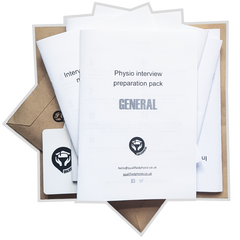by Nic Colombo
This time, we'll look at a classic question often asked in Band 5 and junior interviews for posts that involve community working. We'll give an example of an answer which we think is a good basis to build upon.
All articles from the Physio Interview Preparation blog series ››
NB: Our questions and answers from the Physio interview preparation series are only examples serving as a guide; and depending on the type of job, the place of work, or the interview panel members, you might need to adapt and/or provide other elements in your answers. We hope they help you understand what the interviewers look for, and if you have any questions don't hesitate to leave them in the comment section. You can also grab your copies of our interview preparation packs for dozens of other questions and answers explained.
You arrive at a patient’s house and ring the doorbell but get no answer, what would you do?

First of all, it is important to know (and tell your interviewer that you know) that the Trust or hospital should have a local policy (B) or guidance available for such situations. Every member of staff needs to be aware of it, as well as other policies. Have a look on the Trust's website or ask around to see if someone you know has got access to them. If you can cite the local Trust policies in your interview, this will definitely impress.
Secondly, for your own and your patient's safety, it's important that before going on a visit, you ensure that you have all the details you need at hand. This including the patient details, full address, phone and key safe numbers and the details of their GP, as well as any carers, next of kin or family members. You should also check the electronic database system before your departure to make sure your patient has not been booked for a hospital appointment or has not been admitted into hospital, especially for patients at risk of recurrent admission. (B)
Once you've said this, you can continue to describe the procedure you would follow. Generally, the procedure for such situation involves:
- Making your presence obvious: this sometimes includes ringing the patient’s landline or mobile phone, knocking on the door and shouting through the letter box (who knows, maybe the doorbell doesn’t work or your patient is asleep without their hearing aid…).
- If they have a key safe that you've been given the code for, then use it and go in.
- Walk around the house, especially if the appointment has been confirmed.
- If they have carers, ring the agency. Also try their GP in case they have made an appointment to see them or to ensure you're not missing any key information, including hospital admission.
- Ring the next of kin if there is one.
- If unsuccessful, ring your office to see if the patient has contacted them. Ring your senior (B) to inform them.
- You would generally only call emergency services when there is a clear need for it such as someone lying on the floor, or if you could hear signs that your patient is in distress.
- Make sure you document everything (B) in your notes in a timely manner.
- Fill out an incident report if necessary. (B)
- Have a think and reflect on what happened (B) – anything you or someone else could have done to prevent the incident? Was the cause of the incident environmental/accidental? Do you need to re-assess or re-consider your treatment? Do you need to perform a new risk assessment?
By covering the above, you'd be on your way to get all the points for this type of question. It doesn't have to be complicated, what the interviewer wants here is to know whether you can follow a procedure and stay safe at all times, both for you and your patient.I hope this helps you in your preparation and, again, remember, the "SDS" rule for every question: you need to demonstrate that you stay safe, you document everything and seek help when required.
Interview buzzwords (B)
In every blog post from the Physio interview series, you'll see (B) next to some words. These are buzzwords and buzzphrases - stuff that interviewers are waiting for you to say in your interview, as they help demonstrate your understanding of the topic.
Here's the list of buzzwords and phrases in this article:
- local Trust policy
- Check the electronic database for patients at risk of recurrent admission
- Inform your senior when required
- Document everything
- Fill out an incident report if necessary
- Reflect
____________________
Related products

Community interview preparation pack
Our Community pack designed for newly-graduated physios or physios applying for band 5 / junior positions includes interview questions and answers, key articles and references and top tips for the job, amongst others.
6 interview preparation packs, for less.
Related blog post(s)
Physio interview preparation - Falls in older people: interview questions, NICE guidelines and multi-factorial assessment - An overview of what is expected from you in the interview if you get a question on falls, by discussing NICE guidelines and pathways, interview questions, and multi-factorial assessments.
____________
About the author

Nicolas Colombo
Nic works as a Senior Physiotherapist both in a busy NHS hospital in East London and privately. Since he qualified, he has gained a large amount of experience assessing and treating various conditions, but also meeting and working alongside all sorts of healthcare professionals. He set up QualifiedPhysio with the idea of making available to future and new physios all the advice, guidance and resources he got along the way, to bridge that gap between Uni and their first job.


